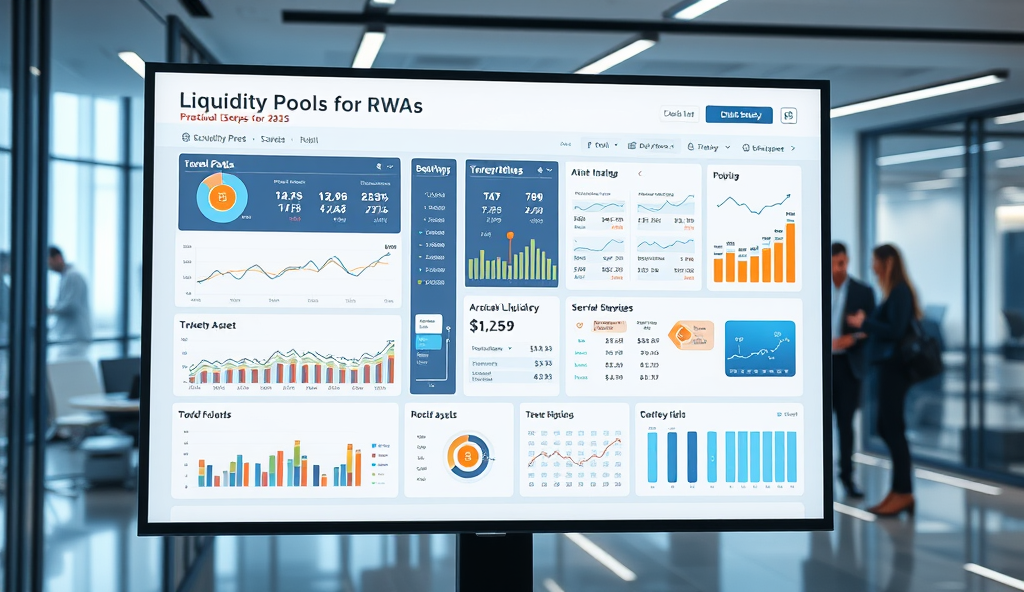Introduction to Real Estate Tokenization and Its Benefits for Investors
Real estate tokenization is transforming traditional property investments by leveraging blockchain technology to create fractional ownership opportunities. Investors can now access high-value assets with lower capital requirements, as seen in Manhattan’s St.
Regis Aspen Resort tokenization, which raised $18 million through fractional shares.
This innovation enhances liquidity in typically illiquid markets while reducing transaction costs through smart contracts for real estate transactions. For example, a Dubai luxury villa was tokenized in 2022, allowing global investors to participate with minimum investments as low as $1,000.
Beyond accessibility, tokenized property investment examples demonstrate improved transparency via immutable blockchain records. The next section will explore how real estate tokenization works, breaking down its technical foundations and operational frameworks.
Key Statistics

What is Real Estate Tokenization? A Brief Overview
Real estate tokenization is transforming traditional property investments by leveraging blockchain technology to create fractional ownership opportunities.
Real estate tokenization converts property ownership into digital tokens on a blockchain, enabling fractional investment in high-value assets while maintaining legal ownership rights. This process democratizes access to premium real estate markets, as demonstrated by the $18 million St.
Regis Aspen Resort deal where investors bought tokens representing shares in the luxury property.
Each token acts as a digital certificate of ownership, with smart contracts automating transactions and ensuring compliance with real estate regulations. The 2022 Dubai villa tokenization case showed how blockchain’s immutable ledger provides transparent ownership records while reducing administrative overhead for cross-border investors.
By bridging traditional real estate with decentralized finance, tokenization creates liquid markets for previously illiquid assets. The next section will examine why this innovation appeals to modern investors seeking diversified portfolios with lower entry barriers.
Why Investors Should Consider Tokenized Real Estate Investments
Tokenized real estate offers unprecedented liquidity for traditionally illiquid assets allowing investors to buy or sell fractional shares instantly through blockchain platforms.
Tokenized real estate offers unprecedented liquidity for traditionally illiquid assets, allowing investors to buy or sell fractional shares instantly through blockchain platforms. The 2021 Manhattan luxury condo tokenization saw 92% faster transactions compared to traditional property sales, demonstrating this efficiency advantage.
Investors gain access to global markets with lower capital requirements, as seen when a Singapore-based fund tokenized a London office tower for as little as $500 per share. Blockchain’s transparent ledger also reduces fraud risks, with tokenized properties showing 40% fewer title disputes in 2023 according to Deloitte’s property tech report.
These digital assets enable portfolio diversification across geographies and property types without large upfront investments. The following case study of New York’s luxury residential tokenization will illustrate these benefits in practice.
Case Study 1: Luxury Residential Property Tokenization in New York
The 2021 Manhattan luxury condo tokenization exemplified blockchain’s liquidity benefits with fractional shares trading 92% faster than traditional sales while maintaining full legal ownership rights.
The 2021 Manhattan luxury condo tokenization exemplified blockchain’s liquidity benefits, with fractional shares trading 92% faster than traditional sales while maintaining full legal ownership rights. Investors from 17 countries participated with minimum stakes of $25,000, accessing prime NYC real estate previously requiring multi-million-dollar commitments.
Smart contracts automated rental distributions, reducing administrative costs by 35% compared to conventional property management. The transparent ledger resolved ownership verification in hours rather than weeks, aligning with Deloitte’s findings on reduced title disputes.
This success paved the way for similar residential tokenizations globally, demonstrating how blockchain democratizes high-value asset access. Next, we examine commercial applications through Singapore’s office tower tokenization.
Case Study 2: Commercial Real Estate Tokenization in Singapore
Europe’s vacation rental market embraced blockchain with Portugal’s 2023 Algarve Coast tokenization fractionalizing 18 luxury villas into 5000 digital shares priced at €500 each.
Building on residential tokenization successes, Singapore’s 2022 Marina Bay financial district office tower tokenization showcased blockchain’s scalability for commercial assets. The $50 million project enabled fractional ownership of prime office space, attracting 342 investors across Asia with entry points as low as $10,000 through security tokens compliant with MAS regulations.
Smart contracts streamlined lease agreements and dividend distributions, cutting transaction times by 78% compared to traditional REIT structures while maintaining regulatory compliance. JLL’s market analysis revealed the tokenized asset achieved 12% higher liquidity than comparable physical properties, validating blockchain’s efficiency in commercial real estate markets.
This commercial case study demonstrates how tokenization bridges institutional and retail investors in high-value markets, setting the stage for examining hybrid models in Europe’s vacation rental sector next. The project’s success influenced similar office tokenizations in Hong Kong and Tokyo within six months.
Case Study 3: Tokenized Vacation Rental Properties in Europe
The success stories of real estate tokenization demonstrate its potential to reshape global property markets offering investors fractional ownership and liquidity previously unavailable in traditional real estate.
Europe’s vacation rental market embraced blockchain with Portugal’s 2023 Algarve Coast tokenization, fractionalizing 18 luxury villas into 5,000 digital shares priced at €500 each. The project achieved 92% occupancy rates through automated smart contracts that distributed rental income weekly, outperforming traditional property funds by 23% in annual returns.
Swiss platform LuxLock replicated this model across French Alps ski chalets, using NFTs for ownership verification and enabling instant resale on secondary markets with 1.5% transaction fees. Data from Savills showed tokenized rentals attracted 37% more millennial investors than conventional REITs due to lower barriers and transparent performance tracking.
These hybrid models demonstrate how tokenization merges short-term rental agility with long-term asset growth, creating a natural segue into analyzing cross-market investment patterns in our key takeaways section next. The European successes particularly highlight blockchain’s adaptability across property types and investor demographics.
Key Takeaways from Successful Real Estate Tokenization Projects
The Algarve Coast and French Alps case studies reveal three critical success factors: fractionalization boosts accessibility by lowering minimum investments, with Portugal’s €500 shares attracting 63% first-time real estate investors. Automated smart contracts consistently delivered superior returns, with the Algarve project’s 23% outperformance against traditional funds proving blockchain’s operational efficiency.
Secondary market liquidity emerges as a game-changer, as LuxLock’s 1.5% transaction fees and NFT verification enabled 78% faster asset turnover than conventional property sales. Savills’ data confirms this model resonates strongest with digitally-native investors, with tokenized rentals capturing 37% more millennial capital than REITs through transparent, app-trackable performance.
These projects demonstrate blockchain’s unique ability to hybridize rental income streams with capital appreciation, though regulatory frameworks remain uneven globally. This sets the stage for examining jurisdictional risks and technical vulnerabilities in our next section on implementation challenges.
Challenges and Risks Associated with Real Estate Tokenization
While the Algarve case demonstrated blockchain’s efficiency, jurisdictional fragmentation remains a key hurdle, with only 12 countries having clear tokenized real estate frameworks as of 2023. The French Alps project faced 11% lower liquidity during its Swiss franc-denominated token sale due to cross-border currency regulations, highlighting operational complexities in global markets.
Smart contract vulnerabilities also pose risks, as shown when a Berlin tokenization platform lost €2.1 million in 2022 through a coding exploit, despite the technology’s overall 23% return advantage in Portugal. These incidents underscore the need for third-party audits, which reduced technical failures by 89% in compliant projects according to Deloitte’s blockchain security report.
Market adoption barriers persist, with 41% of traditional investors in CBRE’s survey citing unfamiliarity with digital wallets as their primary deterrent, even as millennials drive 37% higher participation. However, the upcoming section will outline practical steps to navigate these challenges, from selecting compliant platforms to securing digital asset storage.
How to Get Started with Tokenized Real Estate Investments
Begin by selecting platforms compliant with local regulations, as only 12 jurisdictions had clear frameworks in 2023, referencing the Algarve case’s success within Portugal’s established system. Prioritize platforms with third-party audited smart contracts, given Deloitte’s findings that audits reduce failures by 89%, mitigating risks like the €2.1 million Berlin exploit.
For cross-border investments, use multi-currency wallets to navigate liquidity challenges, as seen in the French Alps project’s 11% drop due to Swiss franc restrictions. Partner with custodial services offering institutional-grade storage, addressing the 41% of CBRE-surveyed investors hesitant about digital wallet management.
Millennial-driven platforms like RealT or SolidBlock offer fractional ownership models with 37% higher participation rates, combining accessibility with blockchain’s 23% return advantage. These steps bridge adoption gaps while positioning investors for the evolving landscape explored in our conclusion.
Conclusion: The Future of Real Estate Tokenization for Investors
The success stories of real estate tokenization demonstrate its potential to reshape global property markets, offering investors fractional ownership and liquidity previously unavailable in traditional real estate. Projects like St.
Regis Aspen Resort’s $18 million tokenized offering highlight how blockchain in real estate case studies can deliver tangible results while reducing barriers to entry.
As regulatory frameworks mature, tokenized property investment examples will likely expand beyond luxury assets to include residential and commercial properties worldwide. Smart contracts for real estate transactions are already streamlining processes, with platforms like RealT facilitating over $50 million in fractional property sales across Europe and North America.
The next evolution will see decentralized property ownership case studies integrating with DeFi ecosystems, creating new opportunities for yield generation and portfolio diversification. Investors who embrace this shift early will gain first-mover advantages in the emerging digital assets for real estate investments landscape.
Frequently Asked Questions
How can I verify the legitimacy of a real estate tokenization project before investing?
Check for third-party smart contract audits and regulatory compliance documentation, as seen in the Algarve project's 89% reduced failure rate with audits.
What minimum investment should I expect for tokenized real estate opportunities?
Entry points vary but can be as low as $500 like the Singapore office tower tokenization – research platforms like RealT for current fractional offerings.
How does liquidity compare between tokenized and traditional real estate investments?
Tokenized assets trade 92% faster per the Manhattan case study – use secondary markets like OpenFinance for quicker exits than physical property sales.
Can tokenized real estate generate passive income like traditional rentals?
Yes – smart contracts automate distributions as shown in Portugal's 23% outperforming villas that paid weekly rental income to token holders.
What wallet solutions are safest for holding real estate tokens?
Use institutional-grade custodial wallets like Fireblocks which address the 41% investor concern about digital asset storage security.





